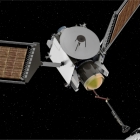"The CAESAR Comet Sample Return Mission"
The Comet Astrobiology Exploration Sample Return (CAESAR) mission was recently selected by the NASA New Frontiers Program for Phase A study. If selected, CAESAR will travel to comet 67P/Churyumov-Gerasimenko and acquire a sample to be returned to Earth for laboratory analysis. The sampling will take place just before the 2031 aphelion passage and yield > 80 g of cometary surface material.
Sample site selection and optical navigation will be supported by the camera
suite, which will also document the sample before, during, and after
acquisition. After the sample is successfully acquired in a 5 second
touch-and-go maneuver, it will be stored in the sealed Sample Containment
System (SCS) inside the Sample Return Capsule. While it slowly warms up,
sublimating volatiles are collected in the passively cooled Gas Containment
System (GCS). After the H2O is sublimated, the GCS is sealed and the SCS
is vented into space. This separation of volatiles and solids protects the
solid sample from alteration while still allowing the analysis of
volatiles on Earth. The SCS is re-sealed before Earth entry.
The analysis of a cometary sample in Earth laboratories will allow complex analyses in unprecedented detail. It will answer questions related to the nature and abundance of interstellar material and processing in the (inner) solar system related to prevailing conditions and transport processes. CAESAR will constrain the formation and evolution of comets, and evaluate the role of comets in delivering water and prebiotic organics to the early Earth. Most of the sample (> 75 %) will be set aside in the dedicated CAESAR curation facility at NASA Johnson Space Center to be studied by generations of scientists to come, using continually advancing tools and methods.

